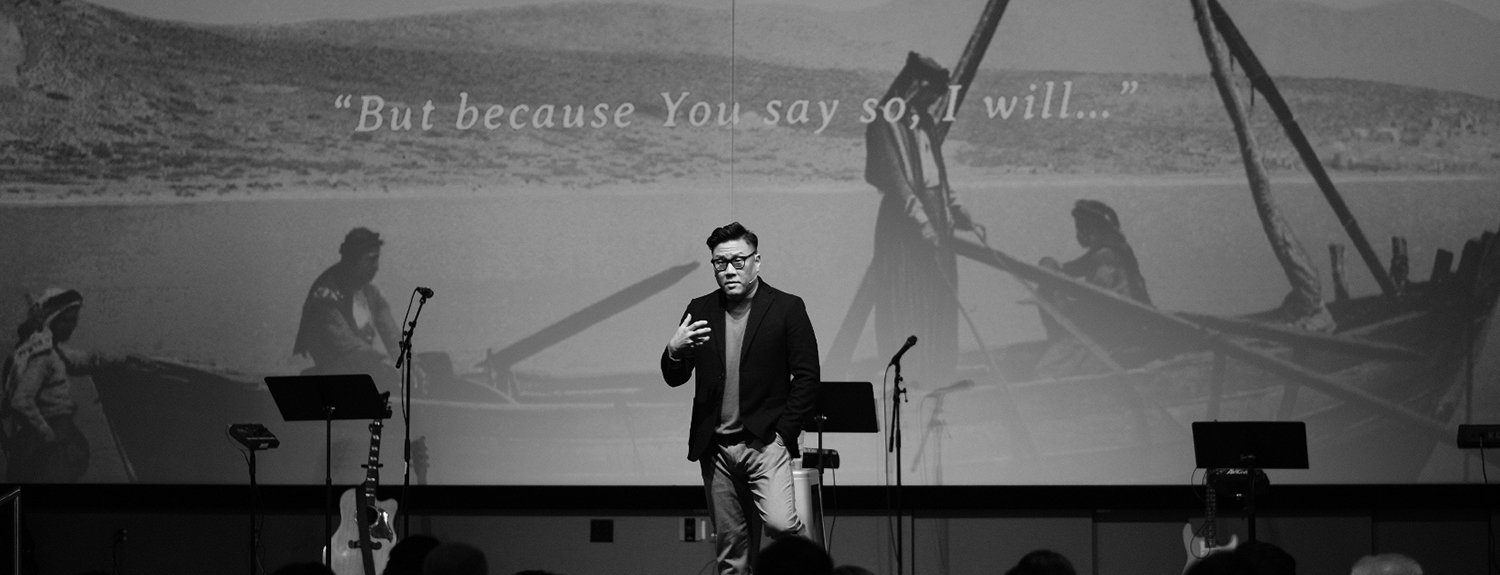“So then you are no longer strangers and aliens, but you are fellow citizens with the saints and members of the household of God, built on the foundation of the apostles and prophets, Christ Jesus himself being the cornerstone, in whom the whole structure, being joined together, grows into a holy temple in the Lord. In him you also are being built together into a dwelling place for God by the Spirit.” (Ephesians 2:19-22 ESV)
Although many of us have accepted Christ in our hearts, that doesn’t necessarily mean that we dwell with Him daily. Often, we don’t know how to host, stay, or abide with God.
Do you feel like you’ve let God in, but it doesn’t feel like He has stayed “in”?
Do you love God, but you’re not sure how to keep Him there?
“It’s one thing for God to visit and enter, but it’s a whole different thing to have Him dwell in us,” Pastor Bryan says.
In Genesis, God creates the first dwelling place and places Adam and Eve in the garden where He communes with them.
God never had a problem creating a space or placing us in a space where we can meet Him.
The problem, rather, is us.
The problem is whether we want to maintain our relationship and dwell with God.
“Then the man and his wife heard the sound of the LORD God as he was walking in the garden in the cool of the day, and they hid from the LORD God among the trees of the garden. But the LORD God called to the man, ‘Where are you?'” (Genesis 3:8-9 NIV)

God doesn’t want to just come to visit you. God wants to make us His dwelling place.
So how do we dwell with God deeply? How do we let God in daily?
In order to dwell with God, we must be willing to go the distance and go a little deeper, each and every day of your life.
How do we do that?
We give Him access and authority, and we abide with Him.

“One day as Jesus was standing by the Lake of Gennesaret, the people were crowding around him and listening to the word of God. He saw at the water’s edge two boats, left there by the fishermen, who were washing their nets. He got into one of the boats, the one belonging to Simon, and asked him to put out a little from shore. Then he sat down and taught the people from the boat. When he had finished speaking, he said to Simon, ‘Put out into deep water, and let down the nets for a catch.’ Simon answered, ‘Master, we’ve worked hard all night and haven’t caught anything. But because you say so, I will let down the nets.’ When they had done so, they caught such a large number of fish that their nets began to break. So they signaled their partners in the other boat to come and help them, and they came and filled both boats so full that they began to sink. When Simon Peter saw this, he fell at Jesus’ knees and said, ‘Go away from me, Lord; I am a sinful man!’ For he and all his companions were astonished at the catch of fish they had taken, and so were James and John, the sons of Zebedee, Simon’s partners. Then Jesus said to Simon, ‘Don’t be afraid; from now on you will fish for people.’ So they pulled their boats up on shore, left everything and followed him.” (Luke 5:1-11 NIV)

Having God dwell in you requires that you give Him access.
“He got into one of the boats, the one belonging to Simon, and asked him to put out a little from shore. Then he sat down and taught the people from the boat.”
You have to let Jesus into your “boat.”
Your boat is your everyday life.
The mundane workings of your daily rhythms.
Your job.
Your schedule.
Your relationships.
You have to let Jesus into those areas of your life.
“Encounters happen at a bush, but Dwelling happens in a boat.”
— Pastor Bryan H. Kim
Having God dwell in us, requires us to give Him authority.
“… he said to Simon, ‘Put out into deep water, and let down the nets for a catch.’ Simon answered, ‘Master, we’ve worked hard all night and haven’t caught anything. But because you say so, I will let down the nets.’”
What Simon is saying to Jesus is: We’ve worked hard all night, like we’re supposed to, but haven’t caught anything. We are disappointed and feel tired from failure. Can’t you see that we are cleaning our empty nets?
What do empty nets look like in our lives?
“I don’t want to forgive again God, won’t it happen again?”
“I don’t want to pray again God, I don’t know why it’s not happening.”
“I don’t want to try again God, it’s too embarrassing, it’s too tiring.”
“I don’t want to love again God, it hurts too much.”
“I don’t want to fish again God, I’ll fail again.”
“I don’t want to try living for you again God, I’ll fail you.”
Often these are rooted in these fears (adapted from “The Wisdom of the Enneagram”):
1. What if I try and prove that something’s “wrong with me”?
2. What if I obey and this proves I am not valuable, lovable?
3. What if I am exposed as unaccomplished, worthless?
4. What if this shows I’m not as unique as I hoped others to view me as?
5. What if I end up helpless and inadequate?
6. What if I’m left to myself again, without support or guidance?
7. What if I can’t handle the pain and the suffering that comes from this?
8. What if I’m harmed or controlled?
9. What if I lose what I love, those I love, and experience separation?
But having God dwell in you, your boat, your life, means to give Him authority, even when it hurts, doesn’t make sense, or seems foolish.
It means saying: “But because You say so, I will…”
It means trusting in His authority. His word.

Having God dwell in you, requires you to Abide with Him.
“When Simon Peter saw this, he fell at Jesus’ knees…”
If we want God to dwell in our hearts, we must abide with Him. We must fall at Jesus’ knees.
God wants to dwell in us, will we give Him access and authority. Will we abide with Him?
What is the boat you need to invite Him into? How is He taking you farther and deeper?
In order to dwell with God, you must be willing to go a little distance and go a little deeper each and every day of your life.
Pray with us this week:
Come, Lord.
Speak, Lord.
Stay, Lord.
I will obey.
I am Your dwelling place.
You can listen to the sermon The Dwelling Place from the Ephesians series that inspired this post here.
All images and materials are copyright protected and are the property of EKKO Church unless otherwise noted and credited to their maker. Please do not copy or distribute without permission.
To read more about the Enneagram, check out “The Wisdom of the Enneagram.”
